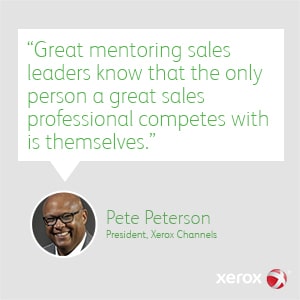 It’s all too easy to say that salespeople are money-motivated, so there’s almost no need to motivate them. Nothing is further from the truth, and if you’re taking the easy way out you can almost bet they will too.
It’s all too easy to say that salespeople are money-motivated, so there’s almost no need to motivate them. Nothing is further from the truth, and if you’re taking the easy way out you can almost bet they will too.
Great sales professionals are like any other great performer. They need great coaches. The greatest basketball players, football player, and other athletes will always cite their coach as the key ingredient to their success. Same for the greatest ballet dancers and musicians.
So how do sales managers become the great coaches that develop the great sales professionals?
Empowering
There are some managers who are afraid to have any of their people “outshine” them. They fear their own image will be somehow reduced. But this is like a great conductor avoiding having anyone in the orchestra who plays any instrument better than they do. It just doesn’t make sense. No conductor can possibly play every instrument that well that they would have anything but awful musicians in the chairs as a result.
Great managers realize that their job is to manage. That’s the skill they must excel in. It is part of their best success strategy to carefully select those candidates who can and will excel. They come to know that the salesperson’s success will also reflect on their own. They don’t fear the superior performer.
In fact, they set that performer free as much as possible. Interpreting management as the process of “telling people what to do” is perhaps the worst possible approach. It will undoubtedly stunt the growth of great performers and, ultimately, lead to their departure.
Great managers empower their people. As suggested by Kenneth Blanchard and Spencer Johnson in the perennial “The One-Minute Manager”, great managers carefully show their people what good performance looks like, pat them on the back to make the connection, and send them off to succeed. Of course, they inspect what they expect, but their people know what their goal is and how to achieve it. If they have any questions about how best to get there, they know they can ask.
Meant to Be a Mentor
Many great sales professionals are very focused on their own achievement of goals, and this may be what makes some of them less-than-optimal managers. But great sales professionals who realize that they can multiply their success by the number of people they can get to achieve similar performance may be the best possible managers, partly because they can share their experience and the insight gained from experience with their proteges.
Again, great performers do not need someone telling them what to do. They instead need mentors, people they respect for their experience and achievements who can share their learnings with them. These highly credible mentors speak directly to the real-world daily process of professional selling. They’ve “been there” and “done that.” They speak more about the interaction with the customer than about the monthly quota. They teach strategies for truly overcoming objections instead of clever manipulations.
Elevating to Leadership: The True Key to Exponential Growth and Performance
Moving from instruction to inspiration, from blocking and tackling to believing and striving, and from production to performance we find ourselves on the path from management up to leadership.
While managers make sure everyone is doing what they’re supposed to be doing, leaders instill in their people an inner need to do the most effective things, the hard work and the smart work that are required to achieve great success. More than just policy and procedure, leaders focus on purpose and performance. They reach inside each of their people to help them find their own reasons for wanting to be the top performer. For needing to compete.
Most leaders really don’t need to manage. They create a powerful relationship with each person they lead, in which those people are so motivated to achieve great success they become self-managing. They super-perform and feel fantastic about doing so.
A manager can measure themselves by how many of their people achieve or exceed quota, and certainly a leader has the same requirements. So how does a leader measure their effectiveness beyond management? Simple:
“A great leader knows their job is done when their group can say ‘We Did It!!!’”
Who Wins?
This is a trick question.
Great sales mentors, great leaders, play the long game. They teach how to build lasting relationships, especially by their own example. They recognize that the only way any sales process can be truly successful is if the answer to the question “Who Wins?” is “Everybody.” The customer must come away feeling that they’ve won the solution they came looking for in the first place at a price that is truly amenable to them. If they do, the salesperson has won, and their company has won, and all the vendors involved have won.
Some managers like to pit their people against each other and have them compete to be #1.
Great mentoring sales leaders know that the only person a great sales professional competes with is themselves. Sharks may need to swim to survive, but salespeople need to improve and grow. Constantly. They focus more on each individual’s sales history and customer satisfaction ratings to provide motivation. They know that the great ones each know what they need to achieve to enjoy the sweet flavor of success. They promote teamwork to encourage each to help the others achieve but never set them against each other.
Great leaders enable each of their people to enjoy success and growth and celebrate the overall achievement of the entire group.
Share this on Twitter!
Tweet: The Power of Empowerment: How to motivate your sales people to do more: https://ctt.ac/9U1s9+ via @XeroxPartners




Great sentiments – I would add that empowering sales people to sell in partnership with the channel is an added skill – it’s all about ‘selling with’ rather than ‘selling to’ and that is a different skillset, which is about business management skills.
Hey Chris, thanks for the comment! You make a great point!
-Cindy